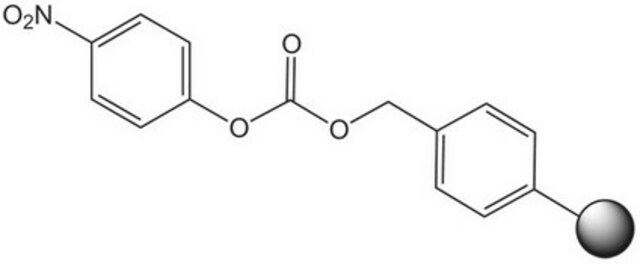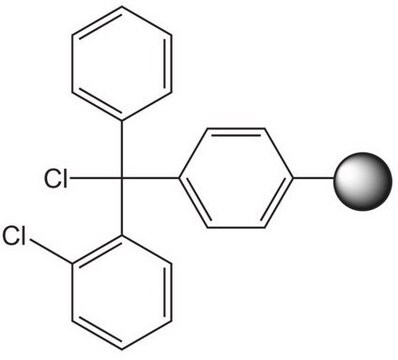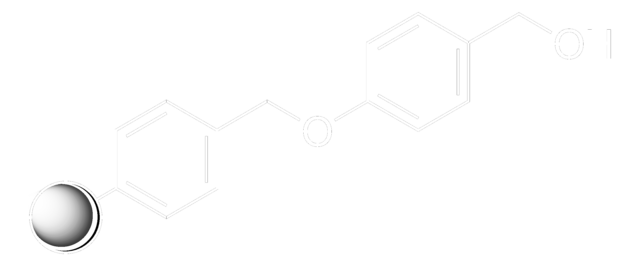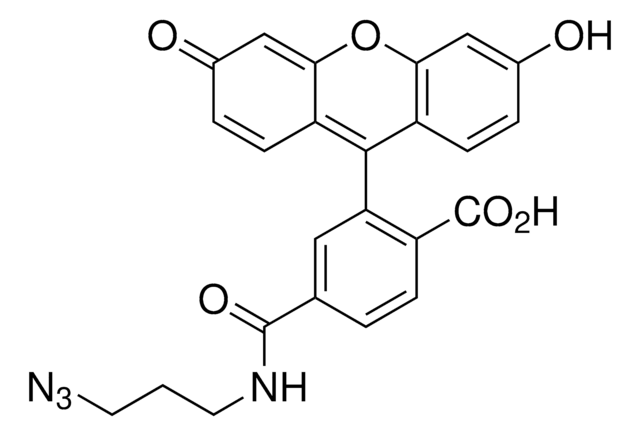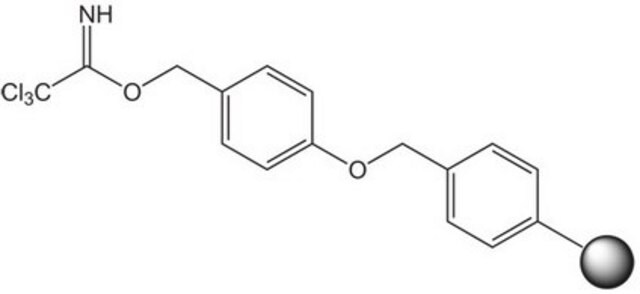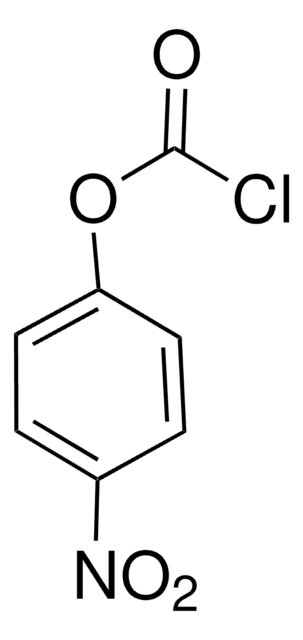8.55019
p-Nitrophenyl carbonate Wang resin
Novabiochem®
Autenticatiper visualizzare i prezzi riservati alla tua organizzazione & contrattuali
About This Item
Codice UNSPSC:
12352005
Prodotti consigliati
Livello qualitativo
Nome Commerciale
Novabiochem®
Stato
beads
Impiego in reazioni chimiche
reaction type: Fmoc solid-phase peptide synthesis
reactivity: amine reactive
Produttore/marchio commerciale
Novabiochem®
applicazioni
peptide synthesis
Temperatura di conservazione
15-25°C
Descrizione generale
Resin-bound p-nitrophenyl carbonate esters react readily with amines to provide the corresponding resin-bound carbamate. Leznoff [1] was the first to demonstrate the utility of such resins in solid phase synthesis with the preparation of mono-acylated diamines from symmetrical diamines. Similarly, Dressman, et al. [2] have used carbamate linked resin-bound amino acid amides to make hydantoins via a base-mediated cyclization/cleavage strategy. Amines linked to p-nitrophenyl carbonate Wang resin possess similar chemical properties to methoxybenzyloxycarbonyl protected amines. The resin-bound carbamate is, therefore, cleaved with TFA or hydrogenolysis to afford the free amine [3]. Alternatively, cleavage by reduction with lithium aluminium hydride can be used to generate N-methylamines [4], and Raju & Kogan [5] have utilized this resin to prepare sulfonamides by acylation of immobilized arylamines and cleavage with LiOH or NaOMe. An analogous p-nitrophenyl carbonate resin prepared from NovaSyn TGA resin was employed as a support for the solid phase immobilization of amidines [6]. This resin was also used to synthesize polyamines [7, 8], and to immobilize indoles [9] and guanidinylating reagents [10]. Loading of this resin can be quantified by measuring the release of p-nitrophenolate [11].
Associated Protocols and Technical Articles
Protocols for Loading of Peptide Synthesis Resins
Literature references
[1] D. M. Dixit, et al. (1978) Israel J. Chem., 17, 248.
[2] B. A. Dressman, et al. (1996) Tetrahedron Lett., 37,937.
[3] J. R. Hauske, et al. (1995) Tetrahedron Lett., 36, 1589.
[4] C. Y. Ho & M. J. Kukla (1997) Tetrahedron Lett., 38, 2799.
[5] B. Raju & T. P. Kogan (1997) Tetrahedron Lett., 38, 3373.
[5] A. K. Ghosh, et al. (2001) J. Org. Chem., 66, 2161.
[6] R. Mohan, et al. (1998) Bioorg. Med. Chem. Lett., 8, 1877.
[7] S. Tomasi, et al. (1998) Bioorg. Med. Chem. Lett., 8, 635.
[8] N. D. Hone & L. J. Payne (2000) Tetrahedron Lett., 41, 6149.
[9] A. L. Smith, et al. (2000) Bioorg. Med. Chem. Lett., 10, 2693.
[10] A. K. Ghosh, et al. (2001) J. Org. Chem., 66, 2161.
[11] A. Paio, et al. (2003) Tetrahedron Lett., 44, 1867.
Associated Protocols and Technical Articles
Protocols for Loading of Peptide Synthesis Resins
Literature references
[1] D. M. Dixit, et al. (1978) Israel J. Chem., 17, 248.
[2] B. A. Dressman, et al. (1996) Tetrahedron Lett., 37,937.
[3] J. R. Hauske, et al. (1995) Tetrahedron Lett., 36, 1589.
[4] C. Y. Ho & M. J. Kukla (1997) Tetrahedron Lett., 38, 2799.
[5] B. Raju & T. P. Kogan (1997) Tetrahedron Lett., 38, 3373.
[5] A. K. Ghosh, et al. (2001) J. Org. Chem., 66, 2161.
[6] R. Mohan, et al. (1998) Bioorg. Med. Chem. Lett., 8, 1877.
[7] S. Tomasi, et al. (1998) Bioorg. Med. Chem. Lett., 8, 635.
[8] N. D. Hone & L. J. Payne (2000) Tetrahedron Lett., 41, 6149.
[9] A. L. Smith, et al. (2000) Bioorg. Med. Chem. Lett., 10, 2693.
[10] A. K. Ghosh, et al. (2001) J. Org. Chem., 66, 2161.
[11] A. Paio, et al. (2003) Tetrahedron Lett., 44, 1867.
Linkage
Replaces: 01-64-0123
Risultati analitici
Color (visual): white to yellow to beige
Appearance of substance (visual): beads
Loading / photometric determination of p-nitrophenol released upon treatment with piperidine / DMF: 0.60 - 1.20 mmol/g
Swelling Volume (in DMF): lot specific result
The polymer matrix is copoly (styrene - 1% DVB ), 100 - 200 mesh.
Appearance of substance (visual): beads
Loading / photometric determination of p-nitrophenol released upon treatment with piperidine / DMF: 0.60 - 1.20 mmol/g
Swelling Volume (in DMF): lot specific result
The polymer matrix is copoly (styrene - 1% DVB ), 100 - 200 mesh.
Note legali
Novabiochem is a registered trademark of Merck KGaA, Darmstadt, Germany
Codice della classe di stoccaggio
11 - Combustible Solids
Classe di pericolosità dell'acqua (WGK)
WGK 1
Punto d’infiammabilità (°F)
Not applicable
Punto d’infiammabilità (°C)
Not applicable
Certificati d'analisi (COA)
Cerca il Certificati d'analisi (COA) digitando il numero di lotto/batch corrispondente. I numeri di lotto o di batch sono stampati sull'etichetta dei prodotti dopo la parola ‘Lotto’ o ‘Batch’.
Possiedi già questo prodotto?
I documenti relativi ai prodotti acquistati recentemente sono disponibili nell’Archivio dei documenti.
Il team dei nostri ricercatori vanta grande esperienza in tutte le aree della ricerca quali Life Science, scienza dei materiali, sintesi chimica, cromatografia, discipline analitiche, ecc..
Contatta l'Assistenza Tecnica.
